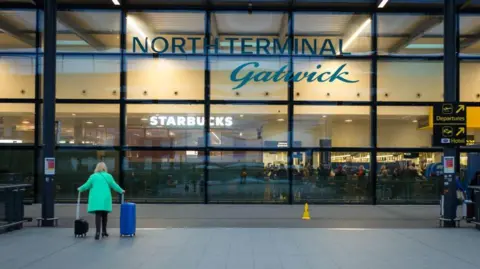Gatwick Airport has gained an unenviable reputation as the UK’s worst airport for flight delays, according to recent data from the Civil Aviation Authority (CAA). The airport, located in West Sussex, experienced an average delay of more than 23 minutes for departing flights in 2024. This figure represents a slight improvement compared to the previous year, where delays averaged nearly 27 minutes. Despite this positive trend, Gatwick remains at the bottom of the list for punctuality among UK airports.
The primary contributor to these delays has been disruptions caused by air traffic control (ATC) issues both within the airport and across continental Europe. Gatwick Airport’s spokesperson acknowledged these challenges, stating that ongoing air traffic control restrictions in other regions of Europe have significantly impacted operations at the airport. In light of these persistent issues, Gatwick, along with its airline partners, has implemented a robust plan aimed at improving on-time performance. Looking ahead to 2025, they expressed hopes for even further enhancements.
For reference, Birmingham Airport came in second for the worst punctuality with an average delay of over 21 minutes, while Manchester Airport followed closely with an average of 20 minutes. These figures highlight that while Gatwick may lead in delays, it is not alone in facing operational challenges.
On a more positive note, Belfast City Airport emerged as the top performer in terms of punctuality across the UK. It recorded an impressive average delay of less than 12 minutes for its flights. This distinction was celebrated as the airport achieved the best punctuality performance in the UK for the second consecutive year. The relatively shorter flight delays at Belfast City Airport provide a sharp contrast to the situations at Gatwick, Birmingham, and Manchester airports.
For passengers affected by delays, the regulations governing flight compensation can be quite complex. Under current guidelines, individuals whose flights are delayed may be entitled to compensation, depending on various factors such as the duration of the delay and the route traveled. However, delays attributed to air traffic control issues are classified as “extraordinary circumstances,” meaning that passengers may not qualify for compensation in these instances.
As part of ongoing discussions regarding airport operations, Gatwick representatives emphasized their airport’s efficiency, claiming it to be the world’s most efficient single-runway airport, with flights arriving or departing every 55 seconds. Moreover, there is hope for expansion; the Transport Secretary, Heidi Alexander, has indicated her readiness to support Gatwick’s plan to utilize its emergency runway for routine use, contingent upon adjustments to the project to ensure public support.
The challenges faced by Gatwick not only affect passengers but also have broader implications for UK air travel. As travel demand continues to rise, addressing the operational constraints and delays at Gatwick will be crucial. Stakeholders within the aviation industry are keen on working together to improve flight schedules and enhance the overall travel experience.
In conclusion, while Gatwick Airport has made strides in reducing flight delays from one year to the next, it still holds the unfortunate title of the least punctual airport in the UK. Players in the aviation sector will need to collaborate effectively to tackle the existing challenges, and the proposed expansion plans could be integral to enhancing capacity and efficiency in the future.











